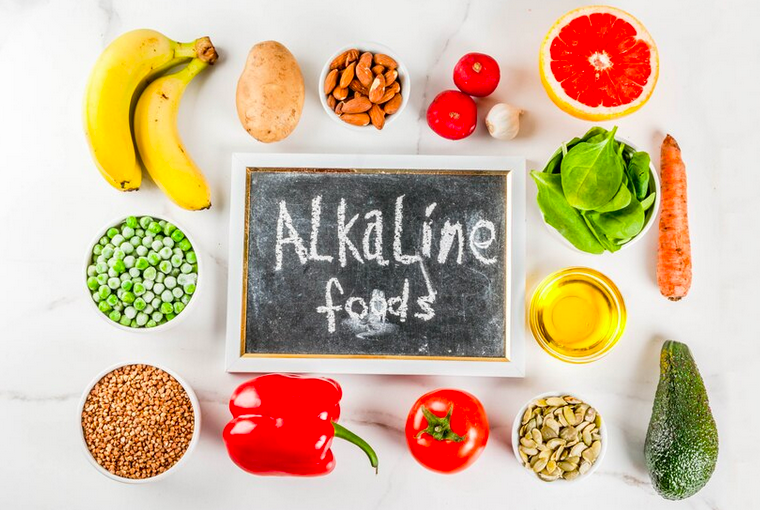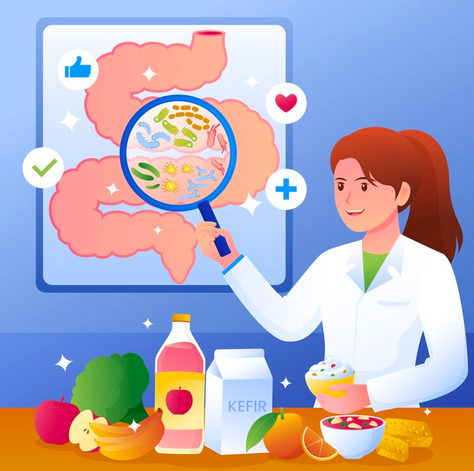Fix Your Gut Health: Why Adjusting Your Diet Can Be Life-Changing
This article explores how food choices have a direct impact on gut-health, mental health and overall health. We understand the concept of alkaline and acidic food and how food impacts our hormonal system.

Maintaining a healthy gut is fundamental to holistic well-being, impacting not only digestion but also hormonal balance, mood, the immune system and overall (women's) health. Our gut health stands as a cornerstone of our overall well-being, exerting a profound influence on various facets of our health, from the efficient digestion of nutrients to bolstering our immune system.
Busy Life = No Time To Eat?
Living a somewhat hectic lifestyle, juggling motherhood, work, and the overall demands of life, I found myself losing control over my diet. Meals became more about quick fixes, hastily grabbed between tasks, rather than mindful nourishment. Ensuring my little one was fed often meant grabbing whatever was convenient and quick, with junk food occasionally making its way into our meals. Coupled with a partner who had a fondness (though, not anymore!) for fried foods, I found myself simply following suit, without considering the impact on my own well-being.

It wasn't until my partner began experiencing health issues, including acid reflux, that I truly grasped the consequences of our dietary choices. After seeking advice from multiple doctors, we finally encountered one who highlighted the significant role of diet in exacerbating his health issues. This revelation prompted us to embark on a journey of dietary transformation, focusing on the importance of gut microbes, pH levels in our food choices and its profound impact on our immune system and overall health. As a busy mom, it was a wake-up call to prioritize not just convenience, but also the quality of nourishment we provide for ourselves and our loved ones.
Maintaining Gut Harmony: The Role of Microbes and Bacteria
Microbes and bacteria in our gut, collectively known as the gut microbiota, play a crucial role in maintaining our health. These microscopic organisms aid in various physiological processes, including digestion, nutrient absorption, and immune function. Additionally, they produce essential vitamins and metabolites that contribute to our overall health. When the balance of this microbial community is disrupted, e.g. due to factors like poor diet, stress, or antibiotic use, it can lead to dysbiosis, an imbalance in gut microbiota composition. This imbalance has been linked to a range of health issues, including digestive disorders, autoimmune diseases, and mental health conditions like anxiety and depression (we’ll talk more about that later). It was clear we had to improve our gut-environments and dive deeper into the world of food and their effects on our bodies.
Understanding Alkaline and Acidic Foods
After this eye-opener I started researching pH-levels and the acidity of the food we eat. I found out that the concept of alkaline and acidic foods revolves around their potential effect on the body's pH balance. Alkaline foods are those that, when metabolized, leave an alkaline residue in the body, potentially raising its pH level. On the other hand, acidic foods leave an acidic residue, potentially lowering the body's pH level. Maintaining a balanced pH level is crucial for overall health, as it influences various bodily functions, including digestion, immunity, and cellular activity. While the body naturally regulates its pH balance, diet plays a significant role in this process.
Consuming a diet rich in alkaline foods, such as fruits, vegetables, nuts, and seeds, can help support a more alkaline environment in the body. Conversely, excessive consumption of acidic foods, such as processed foods, meats, dairy, and caffeine, may contribute to an overly acidic environment, potentially leading to health issues over time.

The Influence of Cooking on Food Acidity
Considering the pH balance of foods, it's vital to understand how cooking can influence their acidity or alkalinity. While certain foods are acidic in their raw state, cooking can either maintain or alter their pH levels. For instance, citrus fruits like lemons are acidic when raw, but their pH levels remain relatively unchanged when used in cooking. Foods like tomatoes become more acidic when cooked due to the concentration of acids through the reduction of water content. On the flip side, certain vegetables like broccoli or spinach may become more alkaline when cooked, as the cooking process breaks down fibers and releases alkaline-forming minerals. We see, culinary techniques can significantly influence the acidity or alkalinity of our meals.
The Dangers of Excess Acidity in the Body
When the body becomes too acidic due to an imbalance in its pH levels, it can lead to a range of health issues. Excess acidity can disrupt various bodily functions, including digestion, metabolism, and immune response. It may also contribute to inflammation, which is linked to conditions such as arthritis, heart disease, and even cancer. Furthermore, acidity can affect nutrient absorption, potentially leading to deficiencies in essential vitamins and minerals. Symptoms of acidosis, the medical term for an overly acidic body, may include fatigue, digestive problems, skin issues, and frequent illness. Therefore, maintaining a balanced pH level is crucial for overall health and well-being, as it supports the body's natural functions and helps prevent the onset of various health problems.
Optimizing Hormones: The Food-Mood Connection
The hormonal system is profoundly influenced by our dietary choices, with certain foods exerting significant effects on hormone levels throughout the body. Acidic foods, in particular, can disrupt hormonal balance and have detrimental effects on both physical and mental health. For instance, a diet high in acidic foods can elevate cortisol levels, the body's primary stress hormone. Elevated cortisol levels not only impact metabolism and immune function but can also contribute to feelings of anxiety and exacerbate symptoms of depression. Additionally, acidic foods can trigger the release of inflammatory cytokines, promoting systemic inflammation and further impacting mental well-being.

Gut Disruptors: The Hazards of Excessive Seed Oils and Alcohol
Seed oils and alcohol can have detrimental effects on gut health when consumed in excess. These oils, such as corn, soybean, and sunflower oil, are high in omega-6 fatty acids, which, when consumed in imbalance with omega-3 fatty acids, can promote inflammation in the gut. Chronic inflammation can damage the intestinal lining, disrupt gut microbiota, and contribute to conditions like leaky gut syndrome and inflammatory bowel disease.
Similarly, excessive alcohol consumption can disrupt the balance of gut bacteria and compromise the integrity of the intestinal barrier. Alcohol irritates the gastrointestinal tract, leading to inflammation and increased permeability of the gut lining. This can result in a range of gut issues, including dysbiosis, impaired nutrient absorption, and increased susceptibility to infections. Therefore, reducing intake of seed oils and alcohol and opting for healthier alternatives can support gut health and overall well-being.
What makes my body acidic apart from foods
In addition to dietary factors, several other lifestyle and environmental factors can contribute to acidity in the body. Chronic stress is a significant contributor, as it triggers the release of stress hormones like cortisol, which can increase acidity levels. Lack of physical activity can also lead to acidity, as exercise helps regulate pH levels by promoting the elimination of acidic waste products through sweat and respiration. Poor sleep habits can exacerbate acidity, as inadequate rest can impair the body's ability to regulate its internal environment effectively. Environmental toxins, such as air pollution and household chemicals, can introduce acidic substances into the body, further disrupting its pH balance. Additionally, certain medications and medical conditions, such as kidney disease or respiratory disorders, can affect acidity levels. Therefore, addressing these lifestyle factors and minimizing exposure to environmental toxins is essential for maintaining a healthy pH balance and overall well-being.

Effect of Antibiotics on Gut Health
The use of antibiotics impacts gut health significantly by disrupting the delicate balance of the microbiota, the diverse community of microorganisms residing in the gastrointestinal tract. While antibiotics are designed to target harmful bacteria causing infections, they also eliminate beneficial bacteria essential for maintaining gut health. This disruption can lead to dysbiosis, an imbalance in gut bacteria, which may result in digestive issues such as diarrhea, bloating, and abdominal discomfort. Furthermore, prolonged or frequent antibiotic use can weaken the immune system and increase susceptibility to infections and other health problems. Therefore, it's essential to use antibiotics as little as possible and consider strategies to support gut health during and after antibiotic treatment, such as probiotic supplementation and consuming prebiotic-rich foods. Taking these proactive steps can help mitigate the negative effects of antibiotics on gut health and promote overall well-being.
How to fix my gut - Enhance the Variety of Gut Microbes
If you're seeking relief from gut issues, there are effective steps you can take to restore balance to your digestive system. Begin by replenishing beneficial gut bacteria with probiotic-rich foods like yogurt, kefir, sauerkraut, and kombucha. These foods help repopulate the gut with healthy microbes, supporting digestive health. Additionally, incorporating fiber-rich foods such as fruits, vegetables, and whole grains can promote regular bowel movements and nourish the gut lining. Avoiding trigger foods like processed foods, refined sugars, and artificial sweeteners can help reduce inflammation and alleviate gut symptoms. Finally, prioritize stress management techniques like deep breathing exercises, meditation, and gentle exercise to calm the nervous system and support overall gut health. By implementing these strategies, you can proactively address gut issues and promote digestive wellness.
Have a look into our 3 day-SOS guide including meal-plan to restore your gut-health:
3 Day Action Plan To Restore Your Gut-Health
Day 1: Gut Reset
- Morning: Start the day with warm water and lemon to kickstart digestion. Follow with a simple breakfast of oatmeal with sliced banana and a sprinkle of ground flaxseeds.
- Mid-Morning: Practice 10 minutes of deep breathing exercises. Inhale deeply through the nose for a count of four, hold for four, and exhale slowly through the mouth for four.
- Lunch: Enjoy a gut-healing bowl of steamed vegetables (such as broccoli, carrots, and kale) with quinoa and a drizzle of olive oil.
- Afternoon: Take a 15-minute mindful walk outdoors, focusing on your breath and the sensations of each step.
- Evening: Prepare a light dinner of grilled salmon with roasted sweet potatoes and a side of sautéed spinach. Wind down with 10 minutes of gentle yoga stretches focusing on twists to aid digestion.
- Before Bed: Practice a 10-minute guided meditation for relaxation and stress relief.
Day 2: Gut Nourishment
- Morning: Begin with a gut-nourishing smoothie made with coconut water, spinach, pineapple, and a scoop of probiotic-rich yogurt.
- Mid-Morning: Practice 10 minutes of alternate nostril breathing to balance the nervous system and promote relaxation.
- Lunch: Enjoy a gut-soothing soup such as bone broth with vegetables and lentils. Include a side of fermented foods like sauerkraut or kimchi for added probiotics.
- Afternoon: Take a break for a 10-minute meditation session, focusing on sending healing energy to the digestive system.
- Evening: Prepare a comforting meal of baked chicken with roasted root vegetables and a mixed green salad. Sip on herbal tea like chamomile or peppermint for further digestive support.
- Before Bed: Practice a restorative yoga sequence for 15 minutes, focusing on gentle stretches and deep breathing to aid digestion and promote relaxation.
Day 3: Gut Rejuvenation
- Morning: Start the day with a gut-rejuvenating breakfast of overnight oats with almond milk, chia seeds, and fresh berries.
- Mid-Morning: Engage in 10 minutes of sun salutations to energize the body and stimulate digestion.
- Lunch: Enjoy a nourishing buddha bowl with quinoa, roasted chickpeas, avocado, and steamed greens.
- Afternoon: Take a break for a 10-minute walking meditation, focusing on the rhythm of your breath and the sensations in your body.
- Evening: Prepare a light and easy-to-digest dinner of grilled fish with steamed vegetables and a side of brown rice.
- Before Bed: Wind down with a relaxing bedtime yoga sequence, focusing on gentle stretches and deep breathing to promote restful sleep and optimal digestion.
Throughout the three days, stay hydrated by drinking plenty of water and herbal teas. Listen to your body's cues and make adjustments to the plan as needed. Remember to prioritize rest, relaxation, and self-care to support your gut health journey.


Revitalizing Your Gut: Navigating Acidic Foods Wisely
When rebooting your gut, it's not necessary to completely avoid acidic foods. While some acidic foods may exacerbate certain gut issues for some individuals, others may tolerate them well. Instead, focus on maintaining a balanced diet that includes a variety of nutrient-dense foods. Incorporate plenty of fruits, vegetables, whole grains, lean proteins, and healthy fats into your meals. These foods provide essential nutrients, fiber, and antioxidants that support overall gut health and well-being. Additionally, prioritize probiotic-rich foods like yogurt, kefir, sauerkraut, and kombucha to help replenish beneficial gut bacteria. Ultimately, listening to your body and paying attention to how different foods make you feel can help you determine which foods to include in your gut reboot plan.
Embracing Change: The Transformative Power of Diet on Gut Health and Well-being
At the end of my research journey on gut health, we were two weeks into restoring our gut health. Changing our diet not only led to more time spent together in the kitchen and eating more regularly as a family but also introduced us to new flavors. Surprisingly, after only two weeks, we felt healthier, lighter, and even happier. The acid reflux vanished. Seeing my partner eat broccoli still amazes me, but I'm proud of him for taking this seriously and changing our diet. This dietary shift also affected me. I noticed increased concentration and reduced stress. Honestly, I'm shocked by how minor changes led to significant improvements. We'll continue our journey towards healthy eating and cherish the knowledge of food's impact on us. Understanding the role of pH levels in our food has truly affected our health and family life. I encourage everyone reading this article to try it for themselves. Improving one's health by reducing food-induced acidity is an easy and achievable choice.
15 Foods Supporting Your Gut health
Maintaining a healthy gut is crucial for overall well-being, as it not only aids in digestion but also supports the immune system and can even influence mood and mental health. Here are 15 foods that are excellent for promoting gut health, each bringing its own set of benefits to the digestive system:
- Yogurt: Rich in probiotics, yogurt is a staple for fostering beneficial bacteria in the gut.
- Kefir: A fermented milk drink similar to yogurt but with a thinner consistency, kefir packs a probiotic punch.
- Sauerkraut: Fermented cabbage that is not only high in fiber but also contains probiotics for gut health.
- Kimchi: A spicy Korean side dish made from fermented vegetables, providing probiotics and fiber.
- Miso: A Japanese seasoning produced by fermenting soybeans, offering a wealth of probiotics.
- Tempeh: Made from fermented soybeans, tempeh is a probiotic-rich food that's also a great source of protein.
- Raw Milk: Unlike pasteurized milk, raw milk contains probiotics and enzymes that are beneficial for the gut. However, it's important to source raw milk from reputable suppliers to ensure safety.
- Almonds: High in fiber, almonds also contain prebiotic properties that can help feed the gut's beneficial bacteria.
- Garlic: Acts as a prebiotic by promoting the growth of beneficial Bifidobacteria in the gut.
- Onions: Rich in inulin, a type of soluble fiber that acts as a prebiotic, onions support gut health.
- Bananas: They restore the health of the bacterial community and provide fiber to aid digestion.
- Apples: High in pectin, a type of soluble fiber that acts as a prebiotic and promotes healthy gut bacteria.
- Whole Grains: Contain non-digestible carbs that can promote the growth of beneficial bacteria within the gut flora.
- Lean Proteins: Foods like chicken, fish, and legumes can promote gut health by nourishing the body without stressing the digestive system.
- Green Vegetables: Spinach, broccoli, and other greens are high in fiber and essential nutrients that feed good bacteria.
Incorporating these foods into your diet can significantly benefit your gut health, contributing to a stronger immune system, improved digestion, and even a better mood.


